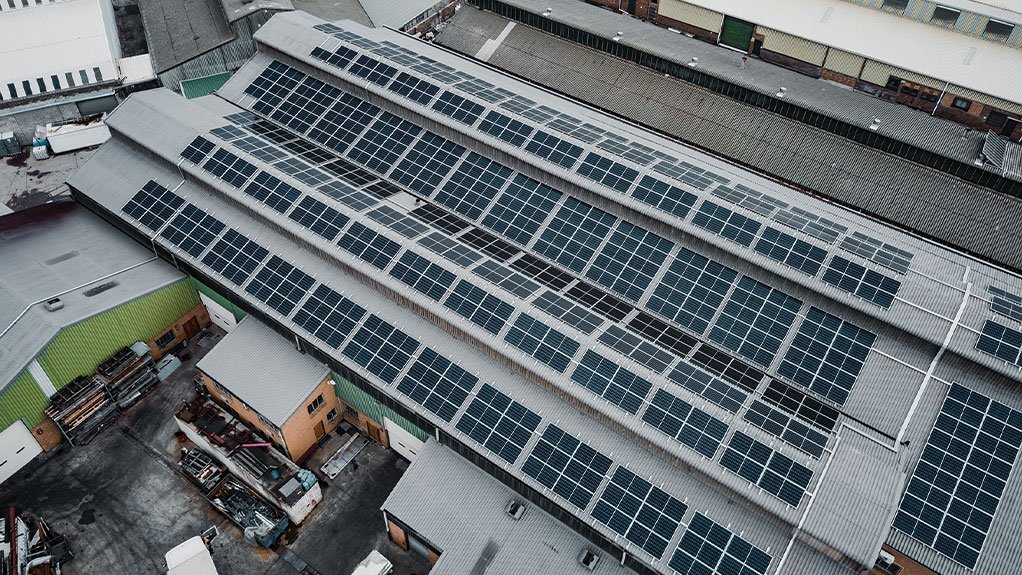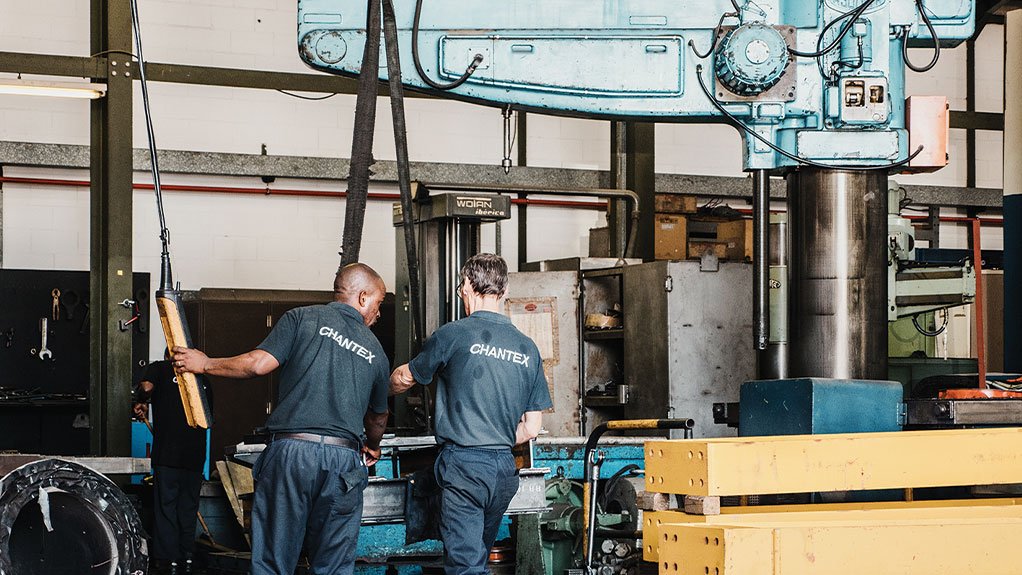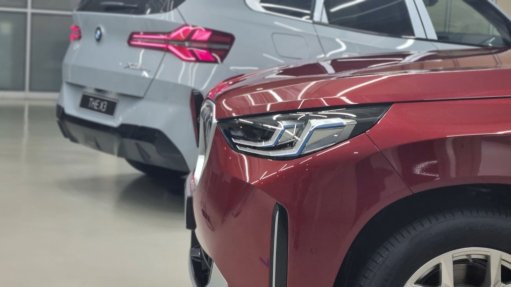Sustainable energy keeps manufacturing in motion



Drone image of complete installation for Chantex, in Cape Town, South Africa
Photo by RenEnergy
RenEnergy’s solar power and energy storage ensures operational efficiency at Chantex
Photo by RenEnergy
The manufacturing sector in South Africa faces several challenges, making the adoption of solar power and energy storage not only appealing, but essential to ensuring operational efficiency and cost-effectiveness.
Solar energy, combined with advanced engineering solutions, offers numerous advantages to the manufacturing sector, driving both economic and environmental benefits.
Rising Energy Costs and Unreliable Supply
Electricity costs have steadily been increasing, and are predicted to keep doing so, affecting the profitability of manufacturing operations. From 2008 to 2022, electricity tariffs in South Africa quadrupled in real terms. Given the ongoing debt crisis and infrastructure failures of the national power provider, businesses can expect continued above-inflation price increases.
These tariff hikes pose a significant long-term challenge to manufacturers. Solar energy offers a cost-effective alternative, reducing dependency on the grid and enabling manufacturers to stabilise their energy costs, ensuring more predictable financial planning.
Most manufacturing businesses are highly sensitive to power interruptions, whether caused by vandalism, maintenance, load reduction or loadshedding. Disruptions may result in production delays, equipment damage, inefficient labour application and increased operational costs. Solar energy, combined with battery energy storage systems (BESS), provides a more reliable and uninterrupted power supply, reducing these risks.
By implementing solar photovoltaic (PV) systems and BESS, manufacturers can shield themselves from the operational inefficiencies caused by inconsistent energy supplies. Engineering plays a critical role here, as designing systems that integrate efficiently with manufacturing processes ensures energy reliability and minimises downtime.
Energy storage systems enable manufacturers to store excess solar energy generated during the day for use during peak demand or at night, maintaining continuous operations. The careful engineering of energy management systems is essential for optimising energy usage and ensuring that manufacturing operations are never interrupted.
Further, the global shift towards sustainability has compelled industries to reduce their carbon footprints. Solar energy, a clean and renewable source, helps manufacturers lower emissions, adhere to environmental regulations, and enhance their corporate social responsibility profiles. This shift is not just ethical, but also a strategic solution to meet stringent sustainability targets.
Energy Independence
By investing in solar energy and BESS, manufacturers can achieve greater energy independence, reducing exposure to grid-related issues. This independence allows for better control over energy costs and improved long-term financial planning. From an engineering perspective, these systems need to be meticulously designed to integrate with existing power infrastructures, ensuring maximum efficiency.
By adopting solar and BESS, manufacturers can also lower their operating costs, leading to better pricing strategies and improved competitiveness in local and international markets. Efficient system designs lead to reduced energy consumption, enabling businesses to thrive in industries with tight margins.
Certain utility providers, both municipal and national, allow manufacturers to export excess electricity generated by their solar systems onto the grid. This creates an additional revenue stream, as manufacturers can earn credits for the surplus energy produced. Engineering solutions ensure that solar systems are optimally designed to maximise energy generation and export potential.
A Quality Solar PV Engineering Example
Service provider Chantex Heavy Machine Shop in Cape Town is a prime example of how engineering and renewable energy can drive operational efficiency. The company operates some of the largest machinery in the Western Cape, specialising in heavy component engineering since 1999. With stringent ISO accreditation requirements and the goal of delivering cost-effective, high-quality products, Chantex faced significant challenges owing to South Africa’s inconsistent energy supply.
Heavy machinery manufacturing is energy-intensive, making it critical to manage rising electricity costs. To address this, Chantex partnered with RenEnergy, a renewable energy company with expertise in commercial solar photovoltaics and energy storage solutions. After a comprehensive analysis of Chantex’s energy usage patterns and production needs, RenEnergy engineered a bespoke hybrid solar power and energy storage solution to suit the facility’s requirements.
A hybrid system combines grid-tied solar power with battery energy storage, ensuring a consistent energy supply. The design had to accommodate Chantex’s unique roof layout, with multiple roof spaces at varying inclinations. RenEnergy’s extensive experience in industrial engineering enabled the optimisation of a 1 721 m² roof-mounted solution, along with a secure equipment room for the batteries and inverters.
“Quality engineering is absolutely vital,” says RenEnergy Africa MD Claude Peters. “It’s not just about offering a solution – it’s about making sure that solution performs at its best over the long term. Our commitment to tailored, high-quality systems has driven our growth in the solar industry, helping businesses achieve both energy sustainability and cost savings.”
RenEnergy’s engineering expertise, especially in the integration of commercial batteries and renewable energy systems, has allowed the company to thrive. In 2023, RenEnergy became part of the international energy group Aggreko, a testament to their quality engineering and solutions. This partnership enables them to deliver renewable energy solutions to a broader range of customers, while retaining the entrepreneurial spirit that defines their business.
As South Africa’s manufacturing sector continues to grapple with rising energy costs and unreliable electricity supply, solar energy and advanced engineering solutions offer a viable path forward. RenEnergy remains committed to delivering cutting-edge renewable solutions that empower businesses such as Chantex to achieve their sustainability and operational goals. Engineering excellence lies at the heart of these solutions, ensuring long-term performance, resilience and environmental impact. Through sustainable energy, it can keep machines in motion and ensure a brighter future for the manufacturing sector.
Chantex solution snapshot
- 360 kWp total installed capacity
- 400 kWh battery capacity
- two hybrid inverters
- two grid-tied inverters
- 468 388 kWh yearly yield
- Estimated average yearly CO2 savings: 454 t
Contact: Juandré Pitout
Tel: 021 851 0685
Email: consultants@renenergy.co.za
Article Enquiry
Email Article
Save Article
Feedback
To advertise email advertising@creamermedia.co.za or click here
Press Office
Announcements
What's On
Subscribe to improve your user experience...
Option 1 (equivalent of R125 a month):
Receive a weekly copy of Creamer Media's Engineering News & Mining Weekly magazine
(print copy for those in South Africa and e-magazine for those outside of South Africa)
Receive daily email newsletters
Access to full search results
Access archive of magazine back copies
Access to Projects in Progress
Access to ONE Research Report of your choice in PDF format
Option 2 (equivalent of R375 a month):
All benefits from Option 1
PLUS
Access to Creamer Media's Research Channel Africa for ALL Research Reports, in PDF format, on various industrial and mining sectors
including Electricity; Water; Energy Transition; Hydrogen; Roads, Rail and Ports; Coal; Gold; Platinum; Battery Metals; etc.
Already a subscriber?
Forgotten your password?
Receive weekly copy of Creamer Media's Engineering News & Mining Weekly magazine (print copy for those in South Africa and e-magazine for those outside of South Africa)
➕
Recieve daily email newsletters
➕
Access to full search results
➕
Access archive of magazine back copies
➕
Access to Projects in Progress
➕
Access to ONE Research Report of your choice in PDF format
RESEARCH CHANNEL AFRICA
R4500 (equivalent of R375 a month)
SUBSCRIBEAll benefits from Option 1
➕
Access to Creamer Media's Research Channel Africa for ALL Research Reports on various industrial and mining sectors, in PDF format, including on:
Electricity
➕
Water
➕
Energy Transition
➕
Hydrogen
➕
Roads, Rail and Ports
➕
Coal
➕
Gold
➕
Platinum
➕
Battery Metals
➕
etc.
Receive all benefits from Option 1 or Option 2 delivered to numerous people at your company
➕
Multiple User names and Passwords for simultaneous log-ins
➕
Intranet integration access to all in your organisation



















